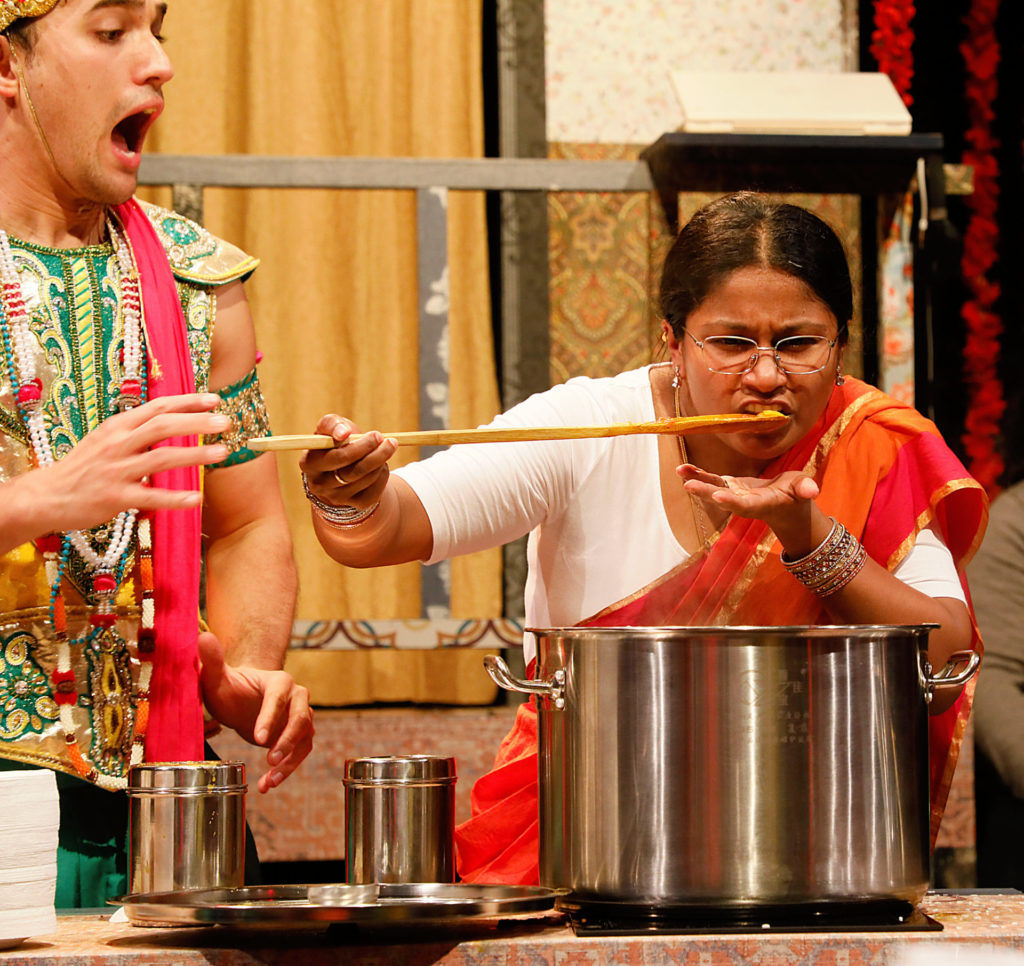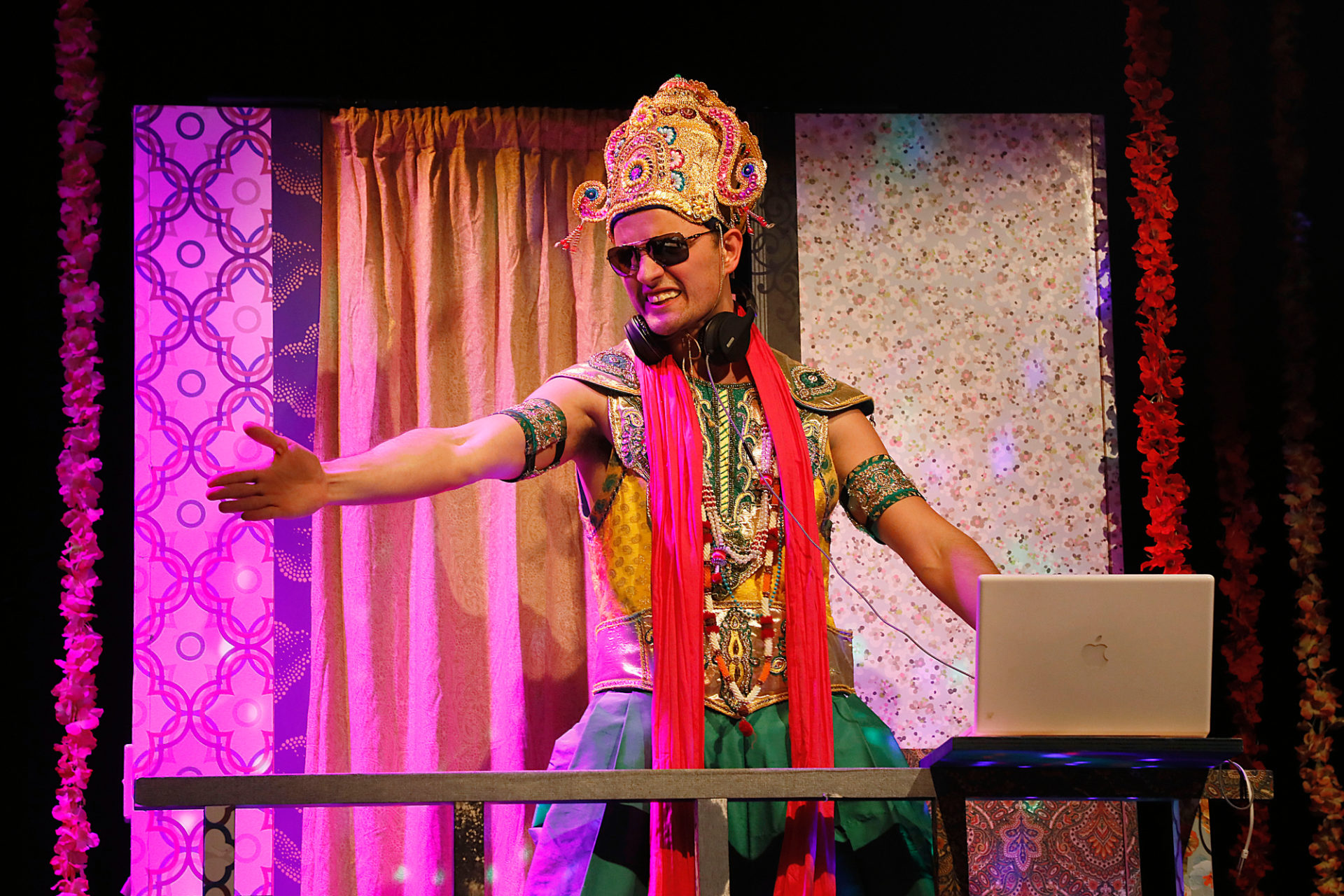On a frigid January evening last weekend, I stepped in from the cold into the back room of Mrs. Krishnan’s shop. I didn’t know what to expect from this production of Indian Ink Theatre Company’s play, Mrs. Krishnan’s Party, as I’d deliberately not read anything about it beforehand. But what I found was a simple story of family, love, and celebration. Only two actors populated the cast — Kalyani Nagarajan as the titular Mrs. Krishnan, and Justin Rogers as the exuberant James — yet their charisma filled the room. Performed in the intimate Studio Theatre at Krannert Center for the Performing Arts, it became apparent as soon as my friend and I stepped into the space that this would be an interactive play.
Rogers greeted us in character as James, as he did all the audience members, and directed us toward our seats in the front row. Some audience members were even directed to sit at a table right on stage. Unbeknownst to us, we were all guests at James’ Onam celebration (a Hindu harvest festival). Unbeknownst to Mrs. Krishnan, this celebration was occurring in the back room of her own shop! The play opened with James turning off the lights and directing all of us to shout “Surprise!” as soon as he turned them back on once Mrs. Krishnan entered the room. At first angry at James’ impudence, Mrs. Krishnan slowly warms up to the idea of hosting the gathering, eventually insisting on preparing dal, a delicious dish of lentils and spices, for all the guests. We audience members were roped into the preparation, with boxes of ingredients and utensils spread out all over the space of the Studio Theatre. In one instance, Mrs. Krishnan brought an audience member-cum-guest on stage to open cans of chopped tomatoes for her. In another, she played matchmaker, bringing together three unattached audience members and eventually had them mind the lentils and sauté the onions.
The idea of breaking bread together — in this case, preparing dal and rice together — is integral to this play, and highlights its interactive qualities. The act of preparing food is fundamental to forging connections, as Mrs. Krishnan slowly opened up as she cooked the dal, sharing the legends behind the celebration, and telling us about her beloved husband who passed away. She excitedly talked about her successful son and his impending arrival, exclaiming that he always visits for Onam. We the audience forge connections too, as we’re brought into Mrs. Krishnan’s inner life, and we laugh together. I was reminded of all the times I’d cooked alongside people I love, from family to new acquaintances. The kitchen, the intimate space of the back room, becomes a place where strangers become friends.

This play is a loose sequel to Indian Ink’s first ever production, Krishnan’s Dairy, from 1997. Founded by Jacob Rajan and Justin Lewis in New Zealand, the company has reached international heights of success. Recurring themes in the company’s productions explore the experience of Indians abroad and the complexity that this experience entails. In this play, Mrs. Krishnan frequently finds herself caught between two ideas of herself. On one hand, she’s an Indian wife and mother, where her time in New Zealand is just a chapter of a longer story. She can’t bring herself to let go of her husband’s ashes and dotes on her successful yet glaringly absent son. On the other hand, she’s a successful shop owner who has come to call New Zealand home. She finds a willing receptacle for her maternal love in James, who has failed out of university, yet his enthusiasm for her own people’s celebrations, such as Onam, is infectious.
Ultimately, this is a play about the families we forge, as opposed to the families we’re born into. It’s about finding different kinds of love in unexpected places, as Mrs. Krishnan finds someone who appreciates her care in James, who is, in turn, in desperate need of that motherly care and guidance. It’s a play about food, about celebration, and about coming together. We, the guests, are invited to take part in this celebration, to break this bread and, quite literally, eat this dal. As the play ended, the actors invited us to eat the food that they’d prepared on stage during the course of the play. Of course, I didn’t hesitate to partake.
As I held my plate and ate, I looked at the people around me, smiling and happy, eating a delicious meal prepared with love and care. Mrs. Krishnan and James might be fictitious, but the food and joy were real. I had come inside out of the cold with one friend by my side, but as we watched and participated in this play, I made many more. As we all stepped back out again into the January chill and went our separate ways, we were strangers once again. However, for a few hours, in the back room of Mrs. Krishnan’s shop, we were able to celebrate Onam together.








